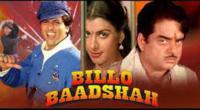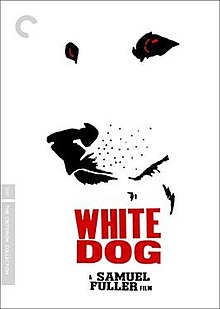White Dog is a 1982 American drama film, which Samuel Fuller directed from a screenplay he and Curtis Hanson had dramatized, which, in turn, they based loosely on Romain Gary's 1970 novel of the same title. The film depicts the struggle of a dog trainer named Keys (Paul Winfield), who is black, trying to retrain a stray dog found by a young actress (Kristy McNichol), that is a "white dog"—a dog trained to make vicious attacks upon, and to kill, any black person. Fuller uses the film as a platform to deliver an anti-racist message as it examines the question of whether racism is a treatable problem or an incurable condition.
| White Dog | |
|---|---|
The Criterion Collection DVD cover | |
| Directed by | Samuel Fuller |
| Produced by | Jon Davison |
| Screenplay by | Samuel Fuller Curtis Hanson |
| Based on | White Dog by Romain Gary |
| Starring | Kristy McNichol Paul Winfield Burl Ives Jameson Parker Parley Baer |
| Music by | Ennio Morricone |
| Cinematography | Bruce Surtees |
| Edited by | Bernard Gribble |
Production company | Paramount Pictures |
| Distributed by | Paramount Pictures |
Release date |
|
Running time | 90 minutes |
| Country | United States |
| Language | English |
| Budget | $7,000,000 (estimated) |
| Box office | $46,509 (United States) |
The film's theatrical release was suppressed for a week in the United States by Paramount Pictures out of concern over negative press after rumors began circulating that the film was racist. Prior to the date, it was released internationally in France in July 1982. Its first official American home video release came in December 2008 when The Criterion Collection released the original uncut film to DVD.
Critics praised the film's hard-line look at racism and Fuller's use of melodrama and metaphors to present his argument, and its somewhat disheartening ending that leaves the impression that while racism is learned, it cannot be cured. Reviewers consistently questioned the film's lack of wide release in the United States when it was completed and applauded its belated release by Criterion.
Screenplay
In the Civil Rights era of the United States, actress Julie Sawyer accidentally runs over a stray White German Shepherd Dog. After the veterinarian treats him, Julie takes him home while trying to find his owners. A rapist breaks into her house and tries to attack her, but the dog protects her. She decides to adopt him, against the wishes of her boyfriend Roland Graele. Unbeknown to her, the dog was trained by a white racist to attack black people on sight. The dog sneaks out of the house, and kills a black truck driver. Later, Julie takes the dog to work with her, and he mauls a black actress on the set.
Realizing that her dog is vicious, Julie takes him to a trainer, Carruthers, who tells her to euthanize the dog. Another dog trainer named Keys, who is black, undertakes reprogramming the dog as a personal challenge. He dons protective gear and keeps the dog in a large enclosure, taking him out on a chain and exposing himself to the dog each day and making sure he is the only one to feed or care for the dog.
The dog escapes and kills an elderly black man in a church, after which Keys manages to recover him, and opts not to turn him over to authorities to continues the training, over Julie's protests. He warns her that the training has reached a tipping point, where the dog might be cured or go insane. He believes that curing the dog will discourage white racists from training dogs like this.
After a lengthy time, it seems the dog is cured, in that he is now friendly towards Keys. Julie confronts the dog's original owner, who has come to claim him, and who presumably trained him to attack black people. She angrily tells him the dog has been cured by a black person in front of his grandchildren who knew the dog to be a loving pet.
Just as Julie and Keys celebrate their victory, the dog, without warning, turns its attention to Carruthers and brutally attacks him. The dog had not previously shown any aggression towards him; no explanation for this is given, but the implication is that the dog's programming has somehow been reversed, though that was never Keys's intention, or that Carruthers has a similarity to the dog's original owner. To save his employer's life, Keys is forced to shoot and kill the dog, and the film ends with the image of the dog's body lying in the center of the training enclosure.
White Dog is a "blunt, highly cinematic parable about race relations" that questions whether racism is a curable mental illness or learned behavior, or if it is an untreatable disease. The unnamed white German Shepherd is the metaphor of racism, with his radically contrasting moments of innocent, typical dog behavior when not around black persons, and his snarling viciousness when he sees a target. Paul Winfield's character Keys, who believes he can help the dog unlearn this behavior, represents the view that racism can be unlearned. Keys's attempts to reprogram the dog become a "bold literalization of the race war," and as the film progresses Keys becomes obsessed with the idea that he can cure the dog. Much like Captain Ahab, he declares that if he fails with this dog, he will find another and another until he succeeds. Keys's counterpart, Carruthers, a white trainer, believes the dog is irredeemable and should be killed, representing the view that racism cannot be cured.
The snarling dog, its white fur stained with bright red stage blood, becomes a typically imposing, outscale Fuller image – the embodiment of snarling, irrational and implacable hatred. Typical, too, is the way Fuller emphasizes the radical contrast between the dog in its innocent, unaroused state – big brown eyes staring up at McNichol – and its plunging, salivating attack mode.
—?Dave Kehr, Chicago Tribune
Scenes showing Kristy McNichol innocently burying her hands in the dog's fur and his normal loving behavior when alone with her provides a stark image of "how hatred can be familiar, reassuringly close." J. Hoberman argues that the film "naturalizes racism in an unnatural way" in the contrasting depictions of white characters horrified by the dog's behavior, and black characters who grimly accept it as a fact of life. The film's ending has been argued to emphasize Fuller's own view that racism is something that is learned, but that once learned is a "poison" that can never truly "be banished from those it infects." But on the other hand, the dog is actually cured of attacking blacks, but not cured of his own hatred since the last thing he does is to attack a white man, and without being provoked into doing so at that. The ending implies therefore that it is hatred (and not racism) that cannot be banished from those it infects.
In Romain Gary's original novel, this was not the story that was told—the dog started to attack white people because a black man embittered by white racism deliberately retrained him to do so.
White Dog's roots lie with a 1970 autobiographical novel written by Romain Gary of the same name. The story was purchased for use by Paramount in 1975, with Curtis Hanson selected to write the screenplay and Roman Polanski hired to direct. Before shooting commenced, Polanski was charged with statutory rape and fled the country, leaving the production in limbo. Over a span of six years, the project was given to various writers and producers, who all focused on the stray dog story from Gary's original work. Gary's activist wife was replaced in the script with a young, unmarried actress because Paramount wanted to contrast the dog's random attacks with a loving relationship between the protagonist and the dog. Paramount executives noted that they wanted a "Jaws with paws" and indicated that they wanted any racial elements to be downplayed. In one memo, the company noted: "Given the organic elements of this story, it is imperative that we never overtly address through attitude or statement the issue of racism per se."
By 1981, Gary's wife, and then Gary himself, had both committed suicide. At the same time, Hollywood was under threat of strikes by both the Writers's and Directors's Guilds. Needing enough films to carry the studio through in case the strikes happened, White Dog was one of thirteen films considered to be far enough along to be completable in a short time frame. With a push from Michael Eisner, White Dog was one of seven that Paramount put on a fast track for production. Eisner pushed for the film to be one of the selected ones because of its social message that hate was learned. Producer Jon Davison was less certain and, early on, he questioned how the film was being marketed. Hanson, back on board as the film's screenwriter, suggested that Samuel Fuller be named the film's director as he felt Fuller was the only one available with the experience needed to complete the film on such a short schedule and with a low budget, while still doing so responsibly with regard to the sensitive material. Davison agreed after visiting Fuller and seeing Fuller act out how he would shoot the film.
Fuller readily agreed, having focused much of his own career on racial issues. Already familiar with the novel and with the concept of "white dogs," he was tasked with "reconceptualizing" the film to have the conflict depicted in the book occur within the dog rather than the people. In an earlier Variety magazine interview, Fuller stated that viewers would "see a dog slowly go insane and then come back to sanity." Before filming began, the National Association for the Advancement of Colored People (NAACP), the Black Anti-Defamation Coalition (BADC), and other civil-rights leaders began voicing concerns that the film would spur racial violence. In an editorial in the Los Angeles Times, Robert Price, executive director of the BADC, criticized the studio for producing the film based on a book by a white man and using a primarily white cast and crew, rather than producing the film with African Americans in key positions. He also considered Gary's work to be a "second-rate novel" and questioned its use when "bookshelves are laden with quality novels by black writers who explore the same social and psychological areas with far more subtlety?"
Fuller, however, was confident in his work and the idea that the film would be strongly anti-racist, particularly with the changes he had made to the original work. The original novel's hate-filled Muslim black trainer, who had deliberately retrained the dog to attack white people, was converted into the character of Keys, who genuinely wished to cure the animal. Fuller also changed the novel's original ending into a more pessimistic film ending. The film was shot in only forty-five days at a cost of $7 million. Five white German Shepherd Dogs played the unnamed central character.
—White Dog: Sam Fuller Unmuzzled, Samuel Fuller, as quoted by J. Hoberman, Criterion Collection
After filming commenced, Paramoun
Watch movie White Dog online on Amazon
Watch movie White Dog online
Watch The Movie On PrimeKasam Teri Kasam Full HD Movie Download

Swades Full HD Movie Download

Saaheb Full HD Movie Download

Billo Badshah Full HD Movie Download

The Power Man Dharam Veer Full HD Movie Download

Chor Mandli Full HD Movie Download

Marshal Full HD Movie Download

Paise Ki Gudiya Full HD Movie Download

Lahu Ke Do Rang Full HD Movie Download

Udaan Full HD Movie Download

Benaam (1999) Full HD Movie Download
.jpg)
Qaidi (1984) Full HD Movie Download
.jpg)
Yalgaar Full HD Movie Download

Hoo Full HD Movie Download

Daku Rani Talwarwali Full HD Movie Download

Bondhu (Bengali) Full HD Movie Download
.jpg)
Patnam Vachina Pativratalu Full HD Movie Download

Sri Raja Rajeshwari Full HD Movie Download

Dharmam Thalai Kaakkum Full HD Movie Download

Devi Putrudu Full HD Movie Download

Mashaal (1984) Full HD Movie Download
.jpg)
Download latest Movie from bollywood
- 1> baaghi 3
- 2> THE SKY IS PINK MOVIE FULL STORY AND REVIEW
- 3> Luka Chuppi
- 4> TO ALL THE BOYS I’VE LOVED BEFORE
- 5> Kabir Singh
- 6> Street Dancer 3D
- 7> Simmba
- 8> Gone Girl
- 9> The Girl Who Lived
- 10> Ludo
- 11> DILWALE DULHANIA LE JAYENGE
- 12> GUILTY
- 13> The Godfather
- 14> Adventures of Rusty
- 15> Sooryavanshi
- 16> Satyameva Jayate 2
- 17> Thappad
- 18> Bhool Bhulaiyaa 2
- 19> KGFChapter 2
- 20> Mardaani 2
- 21> Pinjar
- 22> Shivaji maharaj
- 23> Ek Villian 2
- 24> Hungama 2
- 25> Divergent
- 26> Mumbai Saga
- 27> The Internship
- 28> HIT (telugu)
- 29> Panga
- 30> The perfect date
- 31> 16 December
- 32> Gopala Gopala (Telugu)
- 33> Brahmastra
- 34> Gangubai Kathiawadi
- 35> Manmadhudu
- 36> Nenu local
- 37> Mahanati
- 38> Shatamanam bavathi
- 39> Lagaan
- 40> After
- 41> MOM
- 42> Shamshera
- 43> Raguvaran BTech
- 44> Khakee
- 45> The villain
- 46> OM
- 47> Mr. perfect
- 48> Bueatifull mind
- 49> Hichki
- 50> Gabbar Singh
- 51> Jogi
- 52> Before Sunrise
- 53> Before Sunset
- 54> Before Midnight
- 55> The Big Bull
- 56> Top Gun: Maverick
- 57> The Purge
- 58> The Sky is Pink
- 59> Laxmmi Bomb
- 60> Sadak 2
- 61> Sufna
- 62> Prithviraj
- 63> PK
- 64> Coolie No 1(2020)
- 65> Black Widow
- 66> Dear Zindagi
- 67> Dil Bechara
- 68> PHIR HERA PHERI
- 69> WAR
- 70> Dostana
- 71> RRR: Roudram Ranam Rudhiram
- 72> Maidan
- 73> Dabbang 3
- 74> Chhalaang
- 75> life as we know it
- 76> SherShaah
- 77> Sandeep Aur Pinky Faraar
- 78> Event Horizon
- 79> 83
- 80> Radhe: Your Most Wanted Bhai
- 81> Gunjan Saxena: The Kargil Girl
- 82> Mr India
- 83> Vivah
- 84> Anokha Bandhan
- 85> Ghost
- 86> Bhoot: Part One - The Haunted Ship
- 87> Haseen Dilruba
- 88> Laal Singh Chaddha
- 89> Qismat
- 90> Rajput
- 91> Drive
- 92> Dil Chahta Hai
- 93> Dil Ki Baazi
- 94> Dil Ka Rishta
- 95> Teesri Manzil
- 96> Dil
- 97> Love Aaj Kal
- 98> Khaali Peeli
- 99> Bunty Aur Babli 2
- 100> Atrangi Re
- 101> Gulabo Sitabo
- 102> Jodi
- 103> Suraj Pe Mangal Bhari
- 104> Deewana
- 105> Attack
- 106> Sardar Udham Singh
- 107> Toofan
- 108> THE LOVEBIRDS
- 109> Jersey
- 110> Ginny Weds Sunny
- 111> Thalaivi
- 112> Shiddat
- 113> Angels vs Zombies
- 114> Koi Mil Gya
- 115> Thank God
- 116> Bhuj: The Pride of India
- 117> Hum Aapke Hain Kaun
- 118> The Platform
- 119> Bird Box
- 120> Roohi Afzana
- 121> Torbaaz
- 122> Nikamma
- 123> World War Z
- 124> Extraction
- 125> Train to Busan
- 126> Life of Pi
- 127> SHAADI MEIN JROOR AANA
- 128> Himmat Aur Mehnat
- 129> To All The Boys: P.S. I Still Love You
- 130> Mimi
- 131> Good Newwz
- 132> Shubh Mangal Zyada Saavdhan
- 133> Raabta
- 134> Harry Potter and the Philosopher's Stone
- 135> Harry Potter and the Chamber of Secrets
- 136> Chhapaak
- 137> War of the Worlds
- 138> Harry Potter and the Prisoner of Azkaban
- 139> Harry Potter and the Goblet of Fire
- 140> MURDER MYSTERY
- 141> Shakuntala Devi
- 142> Bachchan Pandey
- 143> Jayeshbhai Jordar
- 144> Sheer Qorma
- 145> Saina
- 146> 'O' Pushpa I hate tears
- 147> Kedarnath
- 148> MS Dhoni The Untold Story
- 149> Chhichhore
- 150> Badhaai Ho
- 151> Unstoppable
- 152> Oz the Great And Powerful
- 153> The Girl on the Train
- 154> Haathi Mere Saathi 2020
- 155> The Conjuring: The Devil Made Me Do It
- 156> Gandhi Se Pehle Gandhi
- 157> The Song of Scorpions
- 158> Srimanthudu
- 159> Hello Guru Prema Kosame
- 160> Beauty and The Beast
- 161> Black Panther
- 162> Charlie and the Chocolate Factory
- 163> Bole Chudiyan
- 164> Fidaa
- 165> Duvvada Jagannadham
- 166> Bruce Lee: The Fighter
- 167> Hyper
- 168> Yaara
- 169> Red (2020)
- 170> Shivam
- 171> That Is Mahalakshmi
- 172> Nishabdham
- 173> Aashram 2020 web series
- 174> Laxmii
- 175> Mismatched
- 176> STUDENT OF THE YEAR 2
- 177> NAIL POLISH
- 178> Ramprasad Ki Tehrvi
- 179> KAAGAZ
- 180> 12 o Clock
- 181> The Power
- 182> bolo hau
- 183> Tribhanga
- 184> JAMUN
- 185> Madam Chief Minister
- 186> Maasaab
- 187> Aadhaar
- 188> Tanhaji
- 189> Bhaagi 3
- 190> Bhootnath
- 191> MALANG
- 192> Jai Mummy Di
- 193> Haathi Mere Saathi 2021
- 194> Shakeela
- 195> Unpaused
- 196> Annayya
- 197> Vamsoddharakudu
- 198> Mrugaraju
- 199> Narasimha Naidu
- 200> Sankranti
- 201> Manasu Maata Vinadhu
- 202> Anjaane
- 203> Apaharan
- 204> Bachke Rehna Re Baba
- 205> Bewafaa
- 206> Roohi
- 207> Radhe
- 208> Zindagi Khoobsoorat Hai
- 209> Yeh Mohabbat Hai
- 210> Yeh Kya Ho Raha Hai?
- 211> The Tomorrow War
- 212> DehradunDiary
- 213> Meri Shaadi Karaoo
- 214> Matruu Ki Bijlee Ka Mandola
- 215> No One Killed Jesica
- 216> Aag Ka Goola
- 217> Eight Million Dollars
- 218> Three Hundred
- 219> Cats and Dog
- 220> Decoy
- 221> Gold Rush
- 222> You Have Got Mail
- 223> Final Destination three
- 224> Tofan
- 225> Jungle
 Story of movie White Dog :
Story of movie White Dog : 